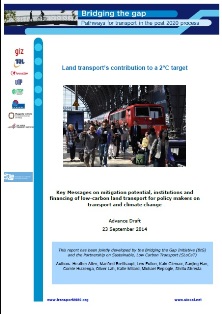Joint Bridging the Gap and SLoCaT Report demonstrates transport's potential contribution to a 2 Degree Scenario
 The Bridging the Gap Initiative (BtG) and the SLoCaT Partnership have developed, in preparation of the Secretary General’s Climate Summit, a joint paper titled “Land Transport’s Contribution to a 2°C target”. The paper provides key messages for climate change negotiators and policy makers on the potential contribution of the land transport sector to global climate change mitigation strategies. The report summarises key facts on the mitigation potential in the land transport sector for both passenger and freight, institutional and global governance perspectives and financing requirements.
The Bridging the Gap Initiative (BtG) and the SLoCaT Partnership have developed, in preparation of the Secretary General’s Climate Summit, a joint paper titled “Land Transport’s Contribution to a 2°C target”. The paper provides key messages for climate change negotiators and policy makers on the potential contribution of the land transport sector to global climate change mitigation strategies. The report summarises key facts on the mitigation potential in the land transport sector for both passenger and freight, institutional and global governance perspectives and financing requirements.
Key findings of the paper include:
- Transport sector can make a substantial contribution to global stabilisation pathways that can keep warming below 2 Degrees Celsius above pre-industrial levels;
- Effective mitigation of Greenhouse Gas (GHG) emissions from land transport requires comprehensive strategies that combine measures to avoid the need for individualized motorized trips with measures to shift passenger and freight transport to the most effective mode, while improving the energy efficiency of fuels and vehicles;
- Cost-effective climate change mitigations strategies for the transport sector are readily available and have been tested as scale;
- An integrated approach to sustainable transport not only reduces GHG emissions, but can also make a substantial contribution to other objectives, such as air quality, safety, energy security, mobility access and productivity.
- UNFCCC mechanisms, especially those related to funding, had in the pastlimited effectiveness in promoting low-carbon transport. Recent changes bode well, however, for the transport sector.
- Although the overall economic impact of low-carbon transport is found to be highly positive there are substantive costs linked to the transformation of the current mostly car dependent transport infrastructure and systems.
- The transport related commitments at the Secretary General’s Climate Summit on urban electric mobility, railways and public transport under the Transport Action Area; as well as the fuel economy commitment under the Energy Action Area and the Green Freight Commitment under the Industry Action Area aim to make a substantial impact on the future emissions from land transport. The messages in this paper can enhance their scaling up and thereby their impact on both climate change and sustainable development.
Please see: Full Text of the Report (pdf)
The Executive Summary of the report can be downloaded here.